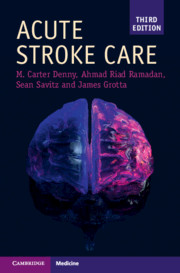Book contents
- Acute Stroke Care
- Acute Stroke Care
- Copyright page
- Contents
- Preface to the Third Edition
- Abbreviations
- Chapter 1 Stroke in the Emergency Department
- Chapter 2 What to Do First
- Chapter 3 Ischemic Stroke
- Chapter 4 Stroke Radiology
- Chapter 5 Intravenous Thrombolysis
- Chapter 6 Endovascular Therapy
- Chapter 7 Neurological Deterioration in Acute Ischemic Stroke
- Chapter 8 Ischemic Stroke Etiology and Secondary Prevention
- Chapter 9 Transient Ischemic Attack
- Chapter 10 Less Common Causes of Stroke
- Chapter 11 Cerebral Venous Sinus Thrombosis
- Chapter 12 Intracerebral Hemorrhage
- Chapter 13 Subarachnoid Hemorrhage
- Chapter 14 Organization of Stroke Care
- Chapter 15 Stroke Rehabilitation
- Chapter 16 Transition to Outpatient Stroke Care
- Book part
- Further In-Depth Reading
- Index
- Plate Section (PDF Only)
- References
Chapter 15 - Stroke Rehabilitation
Published online by Cambridge University Press: 28 October 2019
- Acute Stroke Care
- Acute Stroke Care
- Copyright page
- Contents
- Preface to the Third Edition
- Abbreviations
- Chapter 1 Stroke in the Emergency Department
- Chapter 2 What to Do First
- Chapter 3 Ischemic Stroke
- Chapter 4 Stroke Radiology
- Chapter 5 Intravenous Thrombolysis
- Chapter 6 Endovascular Therapy
- Chapter 7 Neurological Deterioration in Acute Ischemic Stroke
- Chapter 8 Ischemic Stroke Etiology and Secondary Prevention
- Chapter 9 Transient Ischemic Attack
- Chapter 10 Less Common Causes of Stroke
- Chapter 11 Cerebral Venous Sinus Thrombosis
- Chapter 12 Intracerebral Hemorrhage
- Chapter 13 Subarachnoid Hemorrhage
- Chapter 14 Organization of Stroke Care
- Chapter 15 Stroke Rehabilitation
- Chapter 16 Transition to Outpatient Stroke Care
- Book part
- Further In-Depth Reading
- Index
- Plate Section (PDF Only)
- References
Summary
Stroke rehabilitation begins during the acute hospitalization once the patient is medically and neurologically stable. Rehabilitation, with involvement of a multidisciplinary rehabilitation team early during the care of the stroke patient, is one of the critical components of stroke unit care that results in improved outcome and shortened length of stay. While practices vary between countries and among hospitals, at our centers and in most US stroke centers the major focus of rehabilitative efforts occurs after discharge from the acute stroke unit, and is beyond the scope of this book (e.g. the EXCITE trial of constraint-induced movement therapy).
- Type
- Chapter
- Information
- Acute Stroke Care , pp. 226 - 236Publisher: Cambridge University PressPrint publication year: 2019



